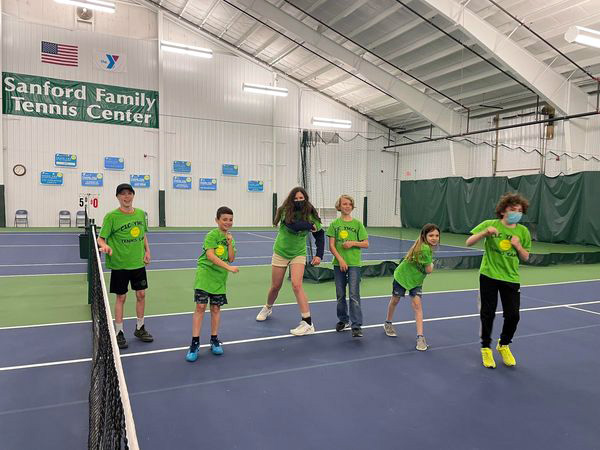
Students participate in the 11th annual NAMI night at the Central Lincoln County YMCA in Damariscotta. (Courtesy photo)
The 11th annual NAMI Night at the Central Lincoln County YMCA was held Thursday, April 28, on the Sanford Family Tennis Center Courts in partnership with NAMI Maine. The event, which features a tennis doubles demonstration by local tennis pros, is held to generate open conversations about mental health and to create awareness of support available in the community. This year the event focused on youth mental health in Lincoln County.
Two courageous teenagers, Gabriela Hagar and Alison Roberts shared their own stories of the impact of mental health on their lives. Other speakers were Lisa Katz, social worker at Lincoln Academy, Rebecca Canon, social worker at Medomak Valley High School, and Nicole Vera, chief operating officer of NAMI Maine.
Sally Farrell, director of operations for the CLC Y, reminded the 100 people who attended, “we all have mental health, and we are all in this together,” according to a news release.
“We can all play a role in supporting each other’s mental health – at the Y and in our communities,” said Karen-Ann Hagar-Smith, director of outreach and community navigation. “The first step is to start talking in our communities about what mental health really is.”
Although not a fundraiser for NAMI Maine, over $2,000 was collected at NAMI Night and donated to support youth mental health programs in Lincoln County.
Help the community get the conversation going about mental health this month by sharing these facts with your friends and family:
FACT: We all have mental health, not just those who live with a mental illness. Everyone faces challenges in their life that can impact our mental health.
FACT: There are many things we can do each day to positively impact our mental health. A few examples include moving, fueling and resting our bodies; being mindful of how we’re feeling and what’s going on around us; connecting with others, and asking for help when needed.
FACT: In addition to biological and environmental factors, mental health is influenced by health inequities that can be attributed to systemic racism, the social determinants of health and exposure to trauma. Ys and community organizations can support mental health by addressing barriers that prevent marginalized communities from having access to the support they need.
FACT: Mental health and physical health are interconnected, and both can impact your overall well-being. For example, research shows that exercise can alleviate long-term depression.
FACT: Positive mental health can be supported in community settings, like the Y, in addition to traditional clinical settings. The Y supports the mental health of individuals and communities in all of the work it does to help people reach their full potential – whether that’s supporting youth in summer camps, helping people achieve their best physical health or providing community navigation services to people who need help with a particular need.
FACT: We all can support the mental health of the community through bringing empathy, compassion, and kindness to our interactions with others. Something as simple as intentionally asking “how are you,” and encouraging honest answers can provide an opportunity to normalize mental health and help others when they need it.
If you or someone you know is struggling with their mental health, know that help is available. Visit the National Suicide Prevention Lifeline for a list of resources. For immediate help 24-hours a day, call 800-273-8255 or text TALK to 741741.
To learn more about the Y’s programs and services visit clcymca.org.



